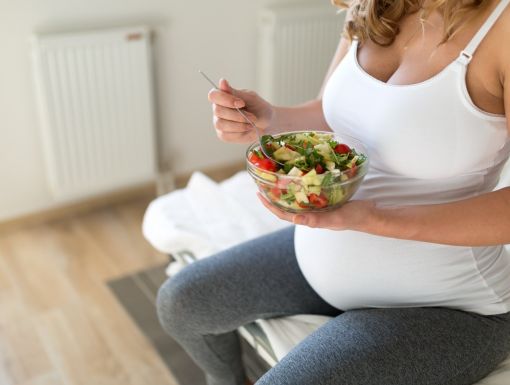
A Dietitian Picks the 7 Best Prenatal Vitamins for 2025
One of the most important things you can do if you are trying to get pregnant or are pregnant is to ensure you have all the necessary nutrients to help support you and your baby. This can be done through a well-balanced diet and possibly adding a prenatal vitamin to your routine.
What are prenatal vitamins?
If you are trying to get pregnant or are pregnant, a prenatal vitamin can be an essential part of your healthcare routine. The two most important prenatal vitamin ingredients are folic acid and iron, but several other vitamins also play a key role.
Folic acid
Some physicians advocate for preconception folate supplementation as a way to reduce birth defects and improve pregnancy outcomes. Folic acid helps form the neural tube, which forms the baby's brain and spine. Women planning to become pregnant should take a multi-vitamin with at least 400 micrograms of folic acid daily for at least a month before conception. There are certain instances, such as a prior pregnancy with spina bifida, where 4,000 micrograms is advised.
Iron
Since you are building the blood volume of the fetus, you will need to provide about 1,000 milligrams of iron to the fetus and placenta over the 40 weeks of pregnancy. Much of this can be achieved with the correct diet; however, taking 30 milligrams of iron daily can greatly assist.
Calcium
It takes about 30 grams of calcium to build the fetal skeleton, and most of this growth occurs during the last 10 weeks. While pregnant, try to get at least 1,000 milligrams of calcium daily.
Vitamin D
Vitamin D regulates the amount of calcium and phosphate in the body, which are needed to keep bones, teeth and muscles healthy. Inadequate vitamin D can lead to abnormal bone growth or fractures in newborns. Some studies link vitamin D deficiency to a higher risk of pregnancy complications such as gestational diabetes, preeclampsia, preterm birth and low birth weight. Aim for 15 micrograms of vitamin D daily.
Vitamin A
Vitamin A plays a role in forming the fetal eyes, ears, limbs and heart. Pregnant people should aim to have 750 to 770 micrograms of vitamin A daily
Vitamin C and E
Both play an important role in fetal collagen production and support the mother's immune system. Aim for 85 milligrams of vitamin C and 15 milligrams of vitamin E daily.
Do I have to take a prenatal vitamin to get pregnant?
The necessity of prenatal vitamins depends on your nutritional status at the beginning of pregnancy. Are you well nourished, malnourished or obese? In the United States, vitamin and mineral supplements may not be required if you are eating a normal healthy diet. When there is a problem with inadequate sources of vitamins or minerals, the first solution should be to incorporate a healthy diet. The U.S. Department of Agriculture's website has excellent suggestions for food sources that have the needed vitamins and features an interactive diet-planning program specifically for pregnant or breastfeeding women.
If you are planning to become pregnant, it is a great idea to schedule a pre-pregnancy visit with your obstetrician, who will ensure that you are up to date with all vaccinations and check your blood count and iron level. If you meet specific criteria, it may also be advisable to check your glucose levels and your levels of vitamin D. By meeting with your doctor before conception, you will know your nutritional status and can start to make any necessary dietary adjustments to prepare for pregnancy, and they can give their recommendation on incorporating a prenatal vitamin into your routine.
Are there side effects to prenatal vitamins?
Overall, prenatal vitamins are safe to take. Iron can occasionally cause nausea and constipation in some people. Drink plenty of fluids with your vitamins and use stool softeners to help decrease unwanted side effects. Large doses of B vitamins can also cause your urine to have a brighter, yellow hue. This is typically harmless but always check with your doctor if you're concerned.
The 7 best prenatal vitamins
- Best overall prenatal vitamin: In my honest professional opinion, the best overall prenatal vitamin is the one you will take consistently and be able to tolerate.
- Best gummy prenatal vitamin – Garden of Life mykind Organics Prenatal Multivitamin
- Why I love it: Whole food based, so the added sugar comes from natural fruit. The supplement is National Science Foundation (NSF) Certified.
- Price: $26.59 for 30 servings (one-month supply)
- Any cons? As with most gummy vitamins, it does not contain iron, so additional supplementation is needed. Additional calcium supplementation may also be recommended. The serving size is large at four gummies.
- Best vegan prenatal vitamin: Deva Nutrition Vegan Prenatal Multivitamin & Mineral-One Daily
- Why I love it: First and foremost, the supplement is third-party tested and approved. It contains significant amounts of the recommended nutrients to support fetal development and prevent birth defects – specifically iron, folate, and choline. Deva Vegan Prenatal is also more affordable than other prenatal options.
- Price: $14.99 for 90 servings (three-month supply)
- Any cons? May not be available at major retailers; can be ordered online.
- Best preconception prenatal vitamin: Nature Made Prenatal Multi + DHA
- Why I love it: Third- party tested and approved by United States Pharmacopeia (USP). Does not contain any artificial colors or dyes. Available at most major retailers for an affordable price. In addition to the standard recommended prenatal nutrients, the soft gel contains DHA to support the potential baby’s eyes, brain, and nervous system.
- Price: $13.71 for 60 servings (two-month supply)
- Any cons? Does not contain choline, so additional supplementation may be needed. Additionally, the supplement contains gelatin so it would not be appropriate for those following a vegan diet.
- Best organic prenatal vitamin: Garden of Life mykind organics Certified Organic Whole Food Prenatal Multivitamin Tablets
- Why I love it: Whole food-based, “Certified Organic” supplement that has been third-party tested. Only 1 tablet daily contains high amounts of recommended nutrients to support a healthy mom and growing baby. Garden of Life is available at most major retailers for an affordable price.
- Price: $20.99 for 30 servings (one-month supply)
- Any cons? Does not contain calcium or choline, so additional supplementation may be needed.
- Best liquid prenatal vitamin – Mary Ruth’s Liquid Multivitamin Prenatal & Postnatal
- Why I love it: Does not contain a lot of added ingredients. The liquid may be better tolerated than pills/capsules as it can easily be added to cold beverages or smoothies. Contains ginger root extract, which may help settle the stomach.
- Price: $39.95 per 32 oz (32 servings, one-month supply)
- Any cons? Does not contain iron, so an extra supplement is needed. It only contains 75 mg calcium, so extra supplementation is recommended.
- Best prenatal vitamin subscription- Perelel
- Why I love it: Created in partnership with and overseen by medical professionals including OB/GYNs and RDs and third-party tested. Has specific vitamin regimen packets for each trimester of pregnancy, as well as for women trying to conceive. Perelel commits to creating safe vitamins that are free of toxic ingredients.
- Price: $49.50/month
- Any cons? Subscription consists of pill packs that contain multiple vitamins to be taken each day, which may be a challenge for women experiencing morning sickness and/or nausea. The vitamin regimen is low in choline, providing only around 22% of the recommended amount. Supplements must be ordered online and are more expensive than other prenatal options.
Sign up for our free, weekly Women's Health newsletter to receive pregnancy tips directly to your inbox.



